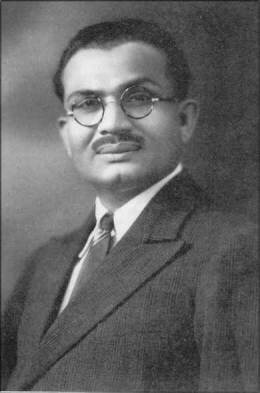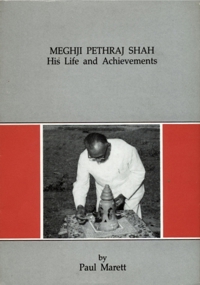
After the sad loss of his wife Monghibai in 1930, Meghjibhai's personal life was to take a turn for the better again. His young daughter needed a mother's care; Meghjibhai needed the help and companionship of a wife. On 18th November 1931 he married again and brought his new wife to Mombasa. She was Maniben, the daughter of Nathoobhai Deva Shah and his wife Kunvarbai, of Navagam near Jamnagar in Saurashtra. She had two brothers, Hemrajbhai (who was one of Meghjibhai's partners in the firm of Premchand Raichand) and Khetsibhai, who was also successful in business in Africa. Although she was only seventeen at the time of their marriage, Maniben had already the intelligence and wisdom of a mature woman. She affectionately filled the place of a mother to the young Sushila and she took on the responsibilities of running a busy household. But, in addition, she took a keen interest in her husband's business, listening to his many plans and aspirations. It was a great adventure for a young girl, but more than half a century later she remembers how she settled down happily without feeling homesick.
When Meghjibhai married Maniben in 1931 he brought back to Africa with him a wife mature beyond her tender age who was to be a support and partner to him in the coming years of business expansion. It was a happy marriage. But the ways of God are mysterious: he gives with one hand and takes with another. In 1932 Maniben gave birth to her first son, Suryakant, to the delight of both parents. But Suryakant's life was tragically short and he died within the year. Meghjibhai mourned silently and bore the will of fate without reproach.
Another blow came two years later when Meghjibhai's father died in 1934. Meghjibhai was on a business trip to Japan when he heard the news of his father' s death. It was a grievous blow to him and an occasion of great sorrow, not least because neither he nor his brothers had been able to be with their father in the last days of his life. Meghjibhai had great love and respect for his father. He could never have progressed so far without the support and encouragement of Pethrajbhai who, in spite of a narrow conventional village background and upbringing, was willing to allow his sons to leave the confines of the village and travel far abroad with his blessings. In their turn, the three boys accepted exile from their home and friends and familiar haunts in order to bring prosperity to their family. It was hard on Meghjibhai to lose his first wife, his first son and his father, all within the space of four years. Meghjibhai' s upbringing gave him the strength to bear the will of fate with equanimity. Birth and death are determined by God: man must accept them. Life must go on and Meghjibhai returned to the duties which business and society laid upon him.
After this testing time, however, happiness and prosperity came hand in hand. On the one hand his business enterprises prospered and with his financial position secure Meghjibhai and his wife Maniben were able to participate in the activities of the Oshwal community and in the wider society around them. They became well known and respected figures. Although Meghjibhai became, many years later, president of the Oshwals in Nairobi I would not be true to say that he was heavily involved in the affairs of his community. He was a man of broad vision: his views transcended communal or especially sectarian groupings; his outlook was international. Nonetheless, he earned the affection and respect of the Oshwal community and is remembered for his good qualities by the older members of the Nairobi Asian community even today.
One member of the Indian community in Nairobi, Mr. Bachula Gathani first met Meghjibhai around 1932 when Meghjibhai and Maniben were living in a nice flat in a modem house in Nairobi At that time he did not go out to other people' s houses very much though he did visit Mr. Gathani's home quite often. He was very particular about his dress: he always wore an English style: three-piece suit and a tie (in contrast to his partner Premchandbhai who normally dressed in homespun white cotton 'khadi' cloth). He rarely wore a cap, though there is a photograph of him about this time wearing the round dark Indian 'Bangalore' cap which was the normal headgear of the Indian businessman in Kenya at that time. Indeed, Meghjibhai and Premchandbhai set an example to their fellow members of the Nairobi Indian community who tended at that time to be careless, even slovenly, about their dress. Mr. A. R. Shah remembers that Meghjibhai and his partner were the first to adopt the habits of clean shoes and a shave and bath every day.

Meghjibhai c. 1935
Although certainly not unsociable (he was friendly and well liked), Meghjibhai had little time for gossip. Indeed, his whole life and interest centred around business. He would glance at the headlines in the newspapers but Mr. Gathani could not remember him listening to the wireless. Music did not interest him and he seemed to have no hobbies except work. Yet, with all that, he was a pleasant and compassionate man. He was a good judge of people, forming his judgements quickly. Business decisions were the same, arrived at briskly (but with careful consideration of the various issues involved) and implemented immediately. If he did sometimes make a mistake he would undo it without delay. He expected the same standards from others as he exacted from himself. He was always active: when thinking his fingers would be moving in rapid calculations and if his hands were occupied when driving a car he would calculate on his toes! At the time of the disastrous Bengal famine in 1943, Meghjibhai was treasurer of the famine relief fund in Nairobi and he insisted on Mr. Gathani as assistant treasurer. Meghjibhai took a genuine interest in the fund: he would telephone every evening to enquire about progress and would personally approach people who were likely to give large donations. It was probably the most important interest in his life at that time. Meghjibhai himself gave the second biggest donation (the largest was from a European lady with estates in Bengal). This was not, in fact, Meghjibhai's first experience of fund-raising. In 1936 there had been a disastrous famine in Meghjibhai's home state of Jamnagar. A meeting of the Oshwal community was convened at the premises of Premchand Raichand. A fund was launched to help the distressed and a considerable sum was raised, with Meghjibhai playing the leading role in the fund-raising.
 Dr. Paul Marett
Dr. Paul Marett

